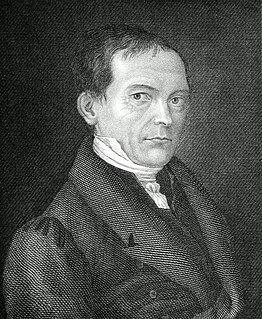
Wilhelm Martin Leberecht de Wette was a German theologian and biblical scholar.
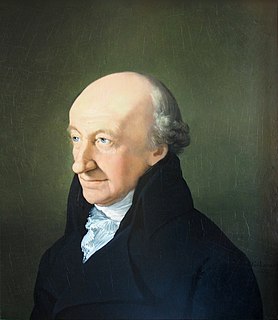
Christoph Martin Wieland was a German poet and writer. He is best-remembered for having written the first Bildungsroman, as well as the epic Oberon, which formed the basis for Carl Maria von Weber's opera of the same name. His thought was representative of the cosmopolitanism of the German Enlightenment, exemplified in his remark: "Only a true cosmopolitan can be a good citizen."
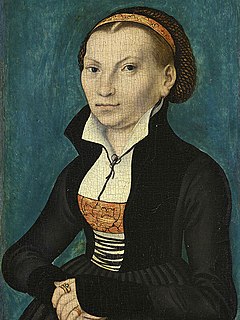
Katharina von Bora, after her wedding Katharina Luther, also referred to as "die Lutherin", was the wife of Martin Luther, German reformer and a seminal figure of the Protestant Reformation. Beyond what is found in the writings of Luther and some of his contemporaries, little is known about her. Despite this, Katharina is often considered an important participant of the Reformation because of her role in helping to set precedents for Protestant family life and clergy marriages.

The Book of Concord (1580) or Concordia is the historic doctrinal standard of the Lutheran Church, consisting of ten credal documents recognized as authoritative in Lutheranism since the 16th century. They are also known as the symbolical books of the Evangelical Lutheran Church.

The Smalcald Articles or Schmalkald Articles are a summary of Lutheran doctrine, written by Martin Luther in 1537 for a meeting of the Schmalkaldic League in preparation for an intended ecumenical Council of the Church.

The Luther seal or Luther rose is a widely recognized symbol for Lutheranism. It was the seal that was designed for Martin Luther at the behest of John Frederick of Saxony in 1530, while Luther was staying at the Coburg Fortress during the Diet of Augsburg. Lazarus Spengler, to whom Luther wrote his interpretation below, sent Luther a drawing of this seal. Luther saw it as a compendium or expression of his theology and faith, which he used to authorize his correspondence. Luther informed Philipp Melanchthon on 15 September 1530, that the Prince had personally visited him in the Coburg fortress and presented him with a signet ring, presumably displaying the seal.
The Augsburg Interim was an imperial decree ordered on 15 May 1548 at the 1548 Diet of Augsburg by Charles V, Holy Roman Emperor, who had just defeated the forces of the Protestant Schmalkaldic League in the Schmalkaldic War of 1546/47. Although it ordered Protestants to readopt traditional Catholic beliefs and practices, including the seven Sacraments, it allowed for Protestant clergymen the right to marry and for the laity to receive communion in both kinds. It is considered the first significant step in the process leading to the political and religious legitimization of Protestantism as a valid alternative Christian creed to Roman Catholicism finally realized in the 1552 Peace of Passau and the 1555 Peace of Augsburg. The Interim became Imperial law on 30 June 1548. The Pope advised all bishops to abide by the concessions made to the Protestants in the Interim in August 1549.

In Protestant Christianity, the relationship between Law and Gospel—God's Law and the Gospel of Jesus Christ—is a major topic in Lutheran and Reformed theology. In these religious traditions, the distinction between the doctrines of Law, which demands obedience to God's ethical will, and Gospel, which promises the forgiveness of sins in light of the person and work of Jesus Christ, is critical. Ministers use it as a hermeneutical principle of biblical interpretation and as a guiding principle in homiletics and pastoral care. It involves the supersession of the Old Covenant by the New Covenant and Christian theology.
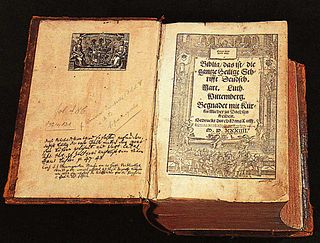
The Luther Bible is a German language Bible translation from Latin sources by Martin Luther. The New Testament was first published in September 1522, and the complete Bible, containing the Old and New Testaments with Apocrypha, in 1534. Luther continued to make improvements to the text until 1545. It was the first full translation of the Bible into German which made use of Greek texts, not just their Latin Vulgate translations. However, the updated 2017 translation of the Luther Bible published by the Evangelical Church in Germany notes that "Luther translated according to the Latin text". Luther did not speak Greek, Hebrew, or Aramaic and relied heavily on other scholars for assistance, particularly Melanchthon. One of the textual bases of the New Testament translation was the Greek version recently published by the Dutch Catholic humanist Erasmus of Rotterdam and called the Novum Instrumentum omne.
Diego de Enzinas, or Jacobus Dryander, Protestant scholar of Spanish origin, active in the Low Countries and Rome, executed by the Roman Inquisition.

Sacramental union is the Lutheran theological doctrine of the Real Presence of the body and blood of Christ in the Christian Eucharist.
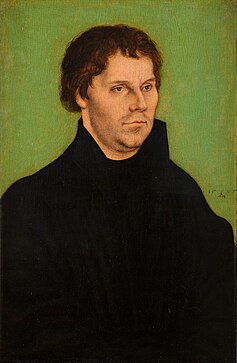
The theology of Martin Luther was instrumental in influencing the Protestant Reformation, specifically topics dealing with justification by faith, the relationship between the Law and Gospel, and various other theological ideas. Although Luther never wrote a systematic theology or a "summa" in the style of St. Thomas Aquinas, many of his ideas were systematized in the Lutheran Confessions.
This is a selected list of works by and about Martin Luther, the German theologian. The emphasis is on English language materials.

Stephan Agricola was a Lutheran church reformer. Born in Abensberg, at a young age he joined the Augustinian order. As a monk, he studied Augustine deeply. As a student, he went to the universities in Bologna and Venice, where in 1519 he became a Doctor of Theology. He began to preach on whole books of the Bible in 1520. He was led to Lutheranism through his study of Augustine's works on the scriptures. He was accused of Lutheranism as a heresy. Although he claimed his independence of Luther, he was arrested and imprisoned in Mühldorf on November 17, 1522. In 1523 he escaped and came to Augsburg, where with Urbanus Rhegius he fully accepted the Reformation and translated Johannes Bugenhagen's tract ag. Zwingjli into German. He was on the Lutheran side during the Marburg Colloquy, became pastor in Hof in 1532, took part in the meeting at Schmalkalden in 1537, and signed the Smalcald Articles. He was instrumental in introducing the Reformation in the Upper Palatinate, as he was pastor at Sulzbach beginning in 1542. During the Schmalkaldic War, he had to flee to Eisleben, where he died in old age on April 10–11, 1547. Stephen Agricola was a staunch uncompromising Lutheran, earnest and devoted. His son, Stephen, translated some of Luther's commentaries on the minor prophets.
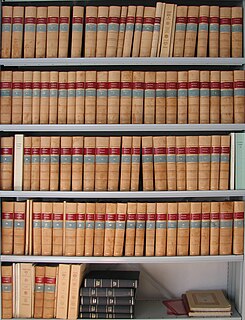
The Weimar edition of Luther's works, also known as the Weimarer Ausgabe (WA), is a critical complete edition of all writings of Martin Luther and his verbal statements, in Latin and German. The official title of this edition is D. Martin Luthers Werke: kritische Gesammtausgabe. Also included are Luther's Table Talk (Tischreden), Letters (Briefe), and Bible Translation. The three subseries are numbered separately.
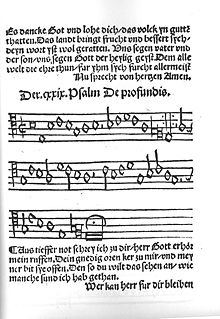
"Aus tiefer Not schrei ich zu dir", originally "Aus tieffer not schrey ich zu dir", later also "Aus tiefer Noth schrei' ich zu dir", is a Lutheran hymn of 1524, with words written by Martin Luther as a paraphrase of Psalm 130. It was first published in 1524 as one of eight songs in the first Lutheran hymnal, the Achtliederbuch, which contained four songs by Luther, three by Paul Speratus, and one by Justus Jonas, and also appeared the same year in the Erfurt Enchiridion. It is part of many hymnals, also in translations. The text inspired vocal and organ music from the Renaissance to contemporary, including composers such as Johann Sebastian Bach, who based a chorale cantata on it, Felix Mendelssohn and Max Reger.
Table Talk is a collection of Martin Luther's sayings around the dinner table at Lutherhaus, Luther's home, but also at other times and locations, such as walks in the garden or notes taken while on journeys. It is based on notes taken by various students of Luther between 1531 and 1546. It was compiled by Johannes Mathesius, J. Aurifaber, V. Dietrich, Ernst Kroker, and several others, and published at Eisleben in 1566.

"Mit Fried und Freud ich fahr dahin" is a hymn by Martin Luther, a paraphrase in German of the Nunc dimittis, the canticle of Simeon. Luther wrote the text and melody, Zahn No. 3986, in 1524 and it was first published in the same year. Originally a song for Purification, it has been used for funerals. Luther included it in 1542 in Christliche Geseng ... zum Begrebniss.

"Wir glauben all an einen Gott" is a Lutheran hymn, a paraphrase of the creed, by Martin Luther and first published in Johann Walter's chorale hymnal Eyn geystlich Gesangk Buchleyn. The hymn was used in several musical settings, including Kleine Geistliche Konzerte I, SWV 303, by Heinrich Schütz, and Johann Sebastian Bach's Clavier-Übung III, BWV 680 and BWV 681. The Zahn number of its hymn tune is 7971.
"Sie ist mir lieb, die werte Magd" is a Lutheran hymn by Martin Luther, first published in the Klugsches Gesangbuch. The subtitle is Ein Lied von der heiligen christlichen Kirche, aus dem 12. Kapitel der Offenb. Joh..















